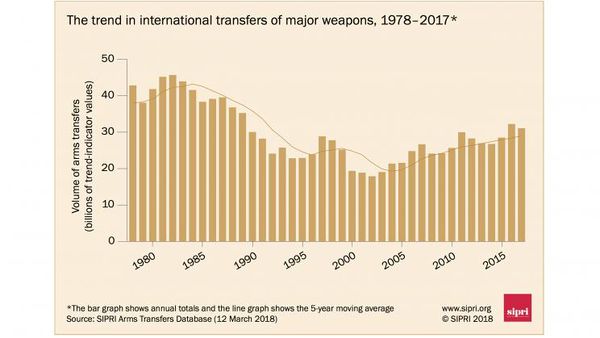Difference between revisions of "Group14 Proposal"
Kalaisr.2017 (talk | contribs) |
Kalaisr.2017 (talk | contribs) |
||
| Line 30: | Line 30: | ||
<!--OVERVIEW CONTENT --> | <!--OVERVIEW CONTENT --> | ||
==Overview== | ==Overview== | ||
| − | The Stockholm International Peace Research Institute (SIPRI) conducts research on arms transfers | + | The global arms trade has been a major concern as the international transfer of arms between states could lead to wars, crimes against humanity and contribute to serious violations of international human rights. |
| + | The Stockholm International Peace Research Institute (SIPRI) conducts research on arms transfers between regions and states aimed at increasing the fundamental understanding of the impact of arms transfers and to support policymaking. An important aim of SIPRI's research is to contribute to greater transparency as a means of ensuring responsible international arms transfers, thereby helping to prevent violent conflict, alleviate tensions, warn about potentially destabilizing arms accumulations and counter the misallocation of limited resources. Based on the latest publication by SIPRI, a rising trend is observed in the volume of international transfers of major weapons, with the highest volume of arm transfers recorded between 2013 to 2017, since 1990. Research conducted by SIPRI also shows that the the global arms trade industry is continuing to export weapons into for deadly armed conflicts. [1] | ||
<!--Tourism--> | <!--Tourism--> | ||
| Line 40: | Line 41: | ||
| style="text-align:center;" | | | style="text-align:center;" | | ||
; | ; | ||
| − | [[File: | + | [[File:TIV Trends.jpg|border|600px]] |
; | ; | ||
|} | |} | ||
<!--Tourism--> | <!--Tourism--> | ||
| − | |||
| − | |||
| − | |||
| − | |||
| − | |||
| − | |||
| − | |||
| − | |||
| − | |||
| − | |||
| − | |||
| − | |||
| − | |||
| − | |||
| − | |||
| − | |||
| − | |||
| − | |||
| − | |||
| − | + | Our project aims to create a interactive visualisation of the global arms transfer to better understand the arms trade dependencies between regions and by countries and find out which countries are the major importers and exporters of arms weapons and to find out the relationships between arm importers ad exporters. | |
<!-- MOTIVATION---> | <!-- MOTIVATION---> | ||
Revision as of 00:13, 8 August 2018
Overview
The global arms trade has been a major concern as the international transfer of arms between states could lead to wars, crimes against humanity and contribute to serious violations of international human rights. The Stockholm International Peace Research Institute (SIPRI) conducts research on arms transfers between regions and states aimed at increasing the fundamental understanding of the impact of arms transfers and to support policymaking. An important aim of SIPRI's research is to contribute to greater transparency as a means of ensuring responsible international arms transfers, thereby helping to prevent violent conflict, alleviate tensions, warn about potentially destabilizing arms accumulations and counter the misallocation of limited resources. Based on the latest publication by SIPRI, a rising trend is observed in the volume of international transfers of major weapons, with the highest volume of arm transfers recorded between 2013 to 2017, since 1990. Research conducted by SIPRI also shows that the the global arms trade industry is continuing to export weapons into for deadly armed conflicts. [1]
Trend in international transfers,1978 to 2017
|
|
Our project aims to create a interactive visualisation of the global arms transfer to better understand the arms trade dependencies between regions and by countries and find out which countries are the major importers and exporters of arms weapons and to find out the relationships between arm importers ad exporters.
Motivation
To ensure a sustainable development of the tourism industry by decreasing the levels of crime and victimization of tourists should be of the utmost concern of policy-makers. We hope that by initializing the visualization of the effects of tourism on crime and public disorder on a local level, greater awareness towards this problem will be achieved, and interoperability between local governmental agencies will be encouraged to address this issue.
Objectives
Through our analysis, we hope to address the following:
1) To explore the Relationship between Spatial Configuration and Crime Rates
We want to find out if the criminal rates differ between spatial areas close to Hotels and Airbnb.
2) To determine if there is a difference in the type of criminal activities and offences committed between spatial areas close to Airbnb versus Hotels.
3) Analyse Crime patterns by Day versus Night Crime; Weekday versus Weekend Crimes between Hotels and Airbnb
Explore if the timings and frequency of criminal activities and offences committed differ between spatial areas close to Airbnb versus Hotels.
Data Sources
| Type | Description | Source |
| Demographics | Detailed Aribnb Listings data for London | |
| Demographics | Detailed listing of Street-level crime data in London | https://data.police.uk/data/ |
| Demographics | Detailed listing of Hotels in London |
Tools and Packages
• rshiny
• ggmap
• leaflet
• tmap
• shinydashboard
• mapview
• rgdal
• rgeos
• dplyr
• spatialPosition
References
[1] The World Bank. https://data.worldbank.org/indicator/ST.INT.DPRT?end=2016&start=1995
[2] The World Bank. https://data.worldbank.org/indicator/ST.INT.XPND.CD?end=2016&start=1995
[3] R. I. Mawby. Crime and disorder, security and the tourism industry. In Handbook of Security; Gill, M., Ed.; Palgrave-Macmillan: London UK, 2014; pp. 383-403
[4] Mawby, R. I.; Brunt, P.; Hambly, Z., Victimization on holiday: A British survey. Int. Rev. Vict. 1996, 6, 201-211
[5] R. I. Mawby et al, 2016. Addressing the Security Concerns of Locals and Visitors for the Sustainable Development of Tourist Destinations

